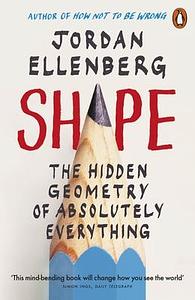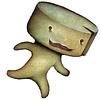Take a photo of a barcode or cover
Pretty good. I felt like I was back I'm high school with all that geometry
challenging
informative
lighthearted
slow-paced
A bit disappointing after How Not To Be Wrong. I was hoping for a book full of interesting ways that people solved problems using maths, with the complexities made simple by Jordan Ellenberg. Instead, there's a lot more history on mathematical figures and developments, and a lot less really practical applications of complex maths.
The book is still interesting, but just not as engrossing as How Not To Be Wrong.
The book is still interesting, but just not as engrossing as How Not To Be Wrong.
challenging
informative
lighthearted
medium-paced
Much more entertaining than I expected from a book on geometry. There are quotable lines throughout, and I laughed out loud more than once.
As other readers have noted, the author jumps quite a bit between topics. If you want things to unfold in a nice methodical progression this may not be the book for you. There's usually a payoff, though, as seemingly unrelated ideas converge and shed light on each other in smartly worded callbacks.
"Geometry" is defined very loosely here. Logic, algebra, and probability often take center stage and tbh are only vaguely related to the idea of "shape." With humans being such visual creatures, the theme of "geometry" expands to cover ideas about navigating many kinds of spaces -- physical, temporal, and hypothetical.
I'm going to enjoy re-reading some of the chapters to understand them better. The one on "How Math Broke Democracy (And Might Still Save It)" seems especially relevant right now.
As other readers have noted, the author jumps quite a bit between topics. If you want things to unfold in a nice methodical progression this may not be the book for you. There's usually a payoff, though, as seemingly unrelated ideas converge and shed light on each other in smartly worded callbacks.
"Geometry" is defined very loosely here. Logic, algebra, and probability often take center stage and tbh are only vaguely related to the idea of "shape." With humans being such visual creatures, the theme of "geometry" expands to cover ideas about navigating many kinds of spaces -- physical, temporal, and hypothetical.
I'm going to enjoy re-reading some of the chapters to understand them better. The one on "How Math Broke Democracy (And Might Still Save It)" seems especially relevant right now.
funny
informative
medium-paced
Talking about topological holes to an unsuspecting person is probably a violation of the Geneva human rights convention. Only a monster would ask a reader (or their DAUGHTER!) to think about straws this way.
in terms of what it aimed to do this is probably a 3 star book but Ellenberg is vvvvvery amiable and funny (lots of nerds think they are funny when they are being self-deprecating. Usually they are just sad. Ellenberg is genuinely funny). And unfortunately, I am a nerd, so to me personally this is a 4 star book.
I am not sure if the theme of "geometry" is sufficiently expressed throughout the book. I don't remember if he explained what geometry IS, exactly, but I remembering thinking there was a missing piece, that connected the earlier sections of Euclid to where he talked about geometric series or whatever came next. I feel like I knew why the latter was tied geometry, but not sure if it was obvious to everyone?
Ellenberg's explorations are very interesting but again, I don't think he ties back to why it is 'geometry' frequently enough. But they are, genuinely, enjoyable, and his enthusiasm for the subjects is unparalleled. Imagine yourself as a keen undergrad, the sparkle in your eye, believing in the best of your degree. Ellenberg makes your first-semester enthusiasm look like a faint battery status light on an old Gameboy.
Some very nice dives into mathematicians themselves. Mathematicians are the funniest bitches on the planet.
in terms of what it aimed to do this is probably a 3 star book but Ellenberg is vvvvvery amiable and funny (lots of nerds think they are funny when they are being self-deprecating. Usually they are just sad. Ellenberg is genuinely funny). And unfortunately, I am a nerd, so to me personally this is a 4 star book.
I am not sure if the theme of "geometry" is sufficiently expressed throughout the book. I don't remember if he explained what geometry IS, exactly, but I remembering thinking there was a missing piece, that connected the earlier sections of Euclid to where he talked about geometric series or whatever came next. I feel like I knew why the latter was tied geometry, but not sure if it was obvious to everyone?
Ellenberg's explorations are very interesting but again, I don't think he ties back to why it is 'geometry' frequently enough. But they are, genuinely, enjoyable, and his enthusiasm for the subjects is unparalleled. Imagine yourself as a keen undergrad, the sparkle in your eye, believing in the best of your degree. Ellenberg makes your first-semester enthusiasm look like a faint battery status light on an old Gameboy.
Some very nice dives into mathematicians themselves. Mathematicians are the funniest bitches on the planet.
slow-paced
funny
informative
lighthearted
reflective
medium-paced
reflective
medium-paced
I’m absolutely loving Shape by Jordan Ellenberg. It’s one of those books that makes you feel smarter while also making you realize how much you didn’t know. Even better — Ellenberg is a professor at the University of Wisconsin-Madison, which makes it feel like there's a local connection since I'm reading it as part of the Data Science Book Club at Miller Brewing, where I work. This month’s selection has been a hit with me, and I can’t wait to dig deeper into the ideas presented in each chapter.
I'm a tech school junkie, so diving into a book that's heavy on theory but also loaded with real-world applications is exactly my kind of fun. Ellenberg's writing style is sharp, witty, and surprisingly accessible, even when he’s explaining higher-level math. He has a gift for making complex mathematical ideas feel intuitive and connected to everyday life — and sometimes hilariously absurd situations.
One of the things I loved about this book is how it explores the way we are taught and how our brains process mathematical ideas. Ellenberg introduces the idea of the "pons asinorum" — the "bridge of asses" — which refers to the idea that teaching math requires carefully guiding students across a metaphorical bridge so they can arrive at the correct conclusion without getting lost. As someone who has often felt like an ass when it comes to complex math, this concept was not only insightful but also comforting. Needing a bridge to understanding isn’t a weakness — it’s just how learning works.
Another fascinating part of the book explores the seemingly simple question of how many holes a straw has. One? Two? It turns out math can’t exactly answer that — because the answer depends on how you define a "hole." Math can only give you frameworks for possible answers, but it’s up to your personal understanding (or idiolect) to settle the matter. I loved how this section explores topology — the study of shapes and their properties — in a way that’s both humorous and deep. It’s one of those topics that seems trivial at first, but the deeper you go, the more profound it becomes.
Symmetry and asymmetry also play a big role in the book, and this section hit close to home for me. Ever since reading Martin Gardner’s New Ambidextrous Universe, I’ve been obsessed with symmetry and asymmetry. It's why I intentionally shave my mustache unevenly — my face is asymmetrical, and I feel like my mustache should reflect that imperfection! Ellenberg dives into the mathematics of symmetry and shows how, even as things become scrunched or distorted, their overall area and properties remain unchanged. Apparently, even as my mustache's shape shifts with age, its total area remains constant — which is both comforting and slightly alarming!
Ellenberg manages to make complex mathematics both deeply philosophical and laugh-out-loud funny. He’s not just explaining math — he’s using it to explore how we think, how we communicate, and how we see the world. I love how Shape challenges you to rethink your assumptions about space, form, and meaning while giving you the tools to see hidden patterns in everyday life.
If you’re into math, science, or just love having your brain twisted in the best possible way, Shape is a must-read. And if you’re part of a book club like mine, you’ll have a blast discussing the philosophical rabbit holes this book sends you down. Ellenberg is a master at making math feel alive, and I can’t recommend this book highly enough!
I'm a tech school junkie, so diving into a book that's heavy on theory but also loaded with real-world applications is exactly my kind of fun. Ellenberg's writing style is sharp, witty, and surprisingly accessible, even when he’s explaining higher-level math. He has a gift for making complex mathematical ideas feel intuitive and connected to everyday life — and sometimes hilariously absurd situations.
One of the things I loved about this book is how it explores the way we are taught and how our brains process mathematical ideas. Ellenberg introduces the idea of the "pons asinorum" — the "bridge of asses" — which refers to the idea that teaching math requires carefully guiding students across a metaphorical bridge so they can arrive at the correct conclusion without getting lost. As someone who has often felt like an ass when it comes to complex math, this concept was not only insightful but also comforting. Needing a bridge to understanding isn’t a weakness — it’s just how learning works.
Another fascinating part of the book explores the seemingly simple question of how many holes a straw has. One? Two? It turns out math can’t exactly answer that — because the answer depends on how you define a "hole." Math can only give you frameworks for possible answers, but it’s up to your personal understanding (or idiolect) to settle the matter. I loved how this section explores topology — the study of shapes and their properties — in a way that’s both humorous and deep. It’s one of those topics that seems trivial at first, but the deeper you go, the more profound it becomes.
Symmetry and asymmetry also play a big role in the book, and this section hit close to home for me. Ever since reading Martin Gardner’s New Ambidextrous Universe, I’ve been obsessed with symmetry and asymmetry. It's why I intentionally shave my mustache unevenly — my face is asymmetrical, and I feel like my mustache should reflect that imperfection! Ellenberg dives into the mathematics of symmetry and shows how, even as things become scrunched or distorted, their overall area and properties remain unchanged. Apparently, even as my mustache's shape shifts with age, its total area remains constant — which is both comforting and slightly alarming!
Ellenberg manages to make complex mathematics both deeply philosophical and laugh-out-loud funny. He’s not just explaining math — he’s using it to explore how we think, how we communicate, and how we see the world. I love how Shape challenges you to rethink your assumptions about space, form, and meaning while giving you the tools to see hidden patterns in everyday life.
If you’re into math, science, or just love having your brain twisted in the best possible way, Shape is a must-read. And if you’re part of a book club like mine, you’ll have a blast discussing the philosophical rabbit holes this book sends you down. Ellenberg is a master at making math feel alive, and I can’t recommend this book highly enough!
challenging
funny
informative
slow-paced




